Access to The Champion archive is one of many exclusive member benefits. It’s normally restricted to just NACDL members. However, this content, and others like it, is available to everyone in order to educate the public on why criminal justice reform is a necessity.
Editor’s Note: On July 10, 2018, at a luncheon at the National Press Club, NACDL formally released a comprehensive study of the trial penalty, the vastly increased punishment imposed upon accused persons who assert the fundamental right to a trial. Trials are now virtually extinct, overcome by a prosecution-dominated plea bargaining system that extracts waivers of the right to a jury trial and many other valuable rights. The Trial Penalty: The Sixth Amendment Right to Trial on the Verge of Extinction and How to Save It documents the prevalence of the trial penalty in the federal criminal justice system, and proposes various reforms to revitalize a critical check on government power. The report is intended to serve as a model for similar efforts to address the tyranny of the trial penalty in every state, as NACDL embarks on a sustained national reform effort to make it possible for accused persons to assert fundamental rights without having to risk grossly enhanced sentences simply for asserting those rights.
Readers may view the entire launch event at https://www.nacdl.org/trialpenaltyreport. As part of NACDL’s continuing effort to promote reform, NACDL intends to highlight the human toll of the trial penalty. Readers are encouraged to share their own stories that document the trial penalty. To complete a brief survey, please visit https://www.surveymonkey.com/r/TrialPenalty.
The launch event attracted an outpouring of support from across the ideological perspective, with prominent groups from the left and right uniting in unqualified condemnation of the trial penalty. This month, Inside NACDL highlights that extraordinary event, including the opening remarks by NACDL Executive Director Norman L. Reimer and excerpts from the remarks delivered by special guests.
Today we begin an effort to resuscitate a fundamental constitutional right that is nearing extinction: the right to a trial by a jury of one’s peers in a criminal prosecution.
The trial penalty is the vast, sometimes geometrical differential between a plea offer and the sentence an accused person faces after trial. It has transformed the criminal justice system into one in which any rational person, even an actually innocent person, must consider a plea offer. And the conditions that attach to most plea offers not only require the waiver of the right to a trial, but also frequently come at the price of having to waive other fundamental constitutional rights, such as the right to challenge unlawfully obtained evidence, the right to discovery, and the right to an appeal.
The manipulation of the potential penalty, either by prosecutors who have been given virtually unreviewable discretion over charging policy, or, in some states, judges that place a high premium on speedy case disposition, creates pressure to waive the right to a trial that is virtually irresistible. The effects of the trial penalty, and the concomitant abuse of plea bargaining, have infected every aspect of the criminal justice system.
As the NACDL trial penalty report makes clear, the penalty is prevalent in all manner of cases in the federal system. But the trial penalty is no less prevalent in state courts. In terms of sheer numbers, its most devastating impact may be in the nation’s misdemeanor courts — where the assertion of a right to a trial can leave people languishing for weeks, months or years, sometimes with no counsel, and often in custody. The United States is a nation that arrests 10-12 million people every year. With jobs, family and homes on the line, long waiting periods to obtain counsel, and loss of liberty due to the inability to afford bail, it is no wonder that at least 97 percent of all cases are resolved without a trial.
Today is the culmination of a long process — research, study, and gathering stories. But it is the beginning of an even longer and more arduous journey. With the release of this report, NACDL hopes to begin a reform movement that will restore this basic right. While this report focuses primarily on the trial penalty in federal cases, our advocacy, and that of the many groups who are participating in this event today, will also focus on the states — where the trial penalty is at least as pervasive.
The founders of this country recognized that the right to a trial — the interposition of one’s peers as a check on the government’s use of the power to prosecute — was essential to the preservation of liberty. The ability to test evidence, both its legality and its factual sufficiency, is essential to prevent tyranny. No one should be forced to surrender those rights through institutional coercion.
Anyone who has ever seen a court conduct the allocution in conjunction with the entry of a guilty plea knows that the most critical question asked of the accused is whether anyone has threatened or in any manner coerced the person to plead guilty. Anyone answering other than “no” buys a one-way ticket to the trial penalty. But what is it, if not coercive, to present a person with the choice of getting a limited sentence versus the risk of a geometrically increased penalty if convicted after a trial? Mind you, not just a few additional weeks or months, but years, and sometimes decades.
If the prosecutor — a public servant charged with doing justice — has determined that a particular sentence in a plea offer is sufficient for punishment, deterrence and protection of public safety, where is the justice in seeking a multiple of that sentence simply because an accused person asserted fundamental constitutional rights? Sadly, that institutional coercion has now become a staple of the nation’s criminal justice system.
It is time to end it.
NACDL does not hold any particular party accountable for how the system has evolved. Nor do we assert that all plea bargaining must be eliminated. But the vast differential that bears no relationship to justice or fairness, and that extracts the waiver of all manner of rights solely to promote the speedy disposal of a case, annihilates a fundament right.
NACDL is grateful to the array of groups represented today. As we have seen increasingly in recent years, criminal justice reform is one area in the national discourse that has truly begun to transcend the ideological divide that separates us on so many other issues. The presence of so many organizations that come to criminal justice with such varied perspectives proves that there is a real desire to curtail the trial penalty, and will provide the momentum for change.
Rick Jones, NACDL Immediate Past President; Executive Director, Neighborhood Defender Services
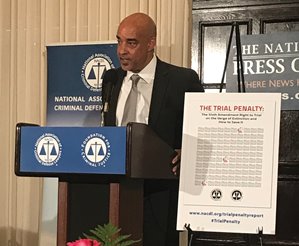 Photo by Cathy Zlomek
Photo by Cathy Zlomek
“The launch of The Trial Penalty is another groundbreaking step NACDL has taken to look at systemic issues in the criminal justice system and promote change and reform . . . The report brings together the entire bar — big firm, small firm, private and public, because all clients must confront the trial penalty . . . Like all the other flaws in the criminal justice system, the trial penalty impacts every defendant, but it inordinately impacts the poor and people of color.”
Barry Pollack, Partner, Robbins, Russell, Englert, Orseck, Untereiner & Sauber LLP
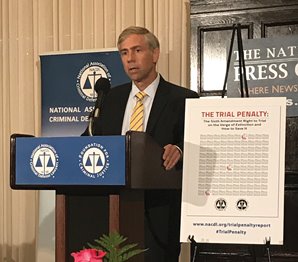 Photo by Cathy Zlomek
Photo by Cathy Zlomek
“It is a curious problem that brings us here today. Our country was founded on the principle that no person accused of a crime should go to jail unless and until the evidence against them has been tested through the adversarial process and a jury of their peers has found them guilty. We have created the gold standard for justice in the world. We have now layered onto it every reason we can possibly think of to make sure it is never used . . . I have heard from our thousands of members who have a front row in the criminal justice system about this issue more than any other. Cases that should be going to trial are not being tried and people are going to jail without the evidence ever being tested.”
Don Salzman, Pro Bono Counsel, Skadden, Arps, Slate, Meagher & Flom LLP
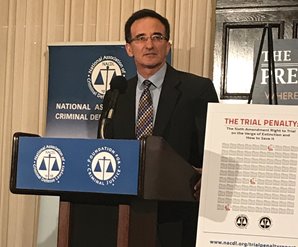 Photo by Cathy Zlomek
Photo by Cathy Zlomek
“The trial penalty is real. It tilts the criminal justice system dramatically away from the Sixth Amendment’s enshrinement of the fundamental right to a trial. It can empower a prosecutor to all but eviscerate that right . . . As the data and anecdotes in this report show, the trial penalty leads to enormous injustice.”
Editor’s Note: Much of The Trial Penalty report was made possible by the pro bono contributions of a team of lawyers at Skadden Arps.
Nicole M. Austin-Hillery, Executive Director, U.S. Program, Human Rights Watch
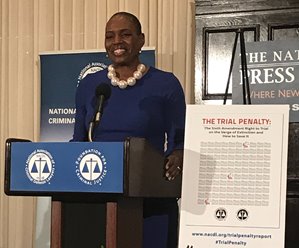 Photo by Cathy Zlomek
Photo by Cathy Zlomek
“For those of us who know that we have to reform the criminal justice system in the United States, we know that this [the trial penalty] is a core part of it . . . Reports are important. But we cannot just let them sit on shelves and collect dust in our offices. We have to get to the folks in the Capitol and in the state houses. We have to tell these stories. We have to give them these numbers. We have to tell them that mandatory minimums do not work. We have to tell them that people have a right to a fair trial by a jury of their peers . . . For any of us who believe in democracy and value it, the trial penalty is a problem that has to be dealt with.”
John Gleeson, Former U.S. District Court Judge; Partner, Deveboise & Plimpton, LLP
 Photo by Cathy Zlomek
Photo by Cathy Zlomek
“Judges are also complicit. Aside from excessive guidelines and mandatory minimums, there is a legal culture in which all the participants are led to believe that if you roll the dice — a terrible metaphor for a fundamental right — then you ought to feel an extra measure of punishment, another pound of flesh taken out of you. So judges are part of the problem . . . We have a system in which you do not get punished unless the government can prove you guilty beyond a reasonable doubt and to the extent that prosecutors are empowered to create a world in which only the extreme risk assumers will exercise that right, we are getting close to extinguishing it.”
Frederick P. Hafetz, Partner, Hafetz & Necheles, LLP
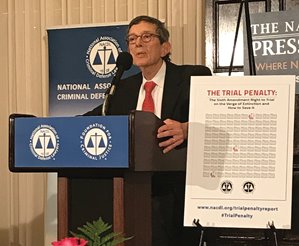 Photo by Cathy Zlomek
Photo by Cathy Zlomek
“As trials are dying, trial lawyers are dying. We are coming upon an era in which there are too few lawyers who are capable of trying a case. You are losing the ability of people to make the jury system work. On the other side, we have the same problem in that prosecutors do not try cases. The problem with the lack of trials by prosecutors is that they do not know a bad case when they see it. If they realized that a witness could not stand up to cross-examination, they might think twice about indicting a case.”
Marc Levin, Vice President of Criminal Justice Policy, Texas Public Policy Foundation and Right on Crime
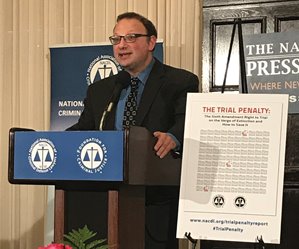 Photo by Cathy Zlomek
Photo by Cathy Zlomek
“From a conservative perspective, for those of us who believe in limited government and individual liberty this is a really important issue. The trial process and juries represent a crucial check on the otherwise unlimited power of government . . . The trial penalty also violates the principles of proportionality and consistency in sentences . . . This problem is, if anything, worse at the state level than at the federal level. In Harris County, 298 people pled guilty to drug charges that later on, when the lab tests came back, it turned out the substance was not even illegal drugs . . . Many plead guilty to time served because they cannot afford bail, so that leverage also causes people to plead guilty . . . I think this report will be a huge benefit to us as we move forward both at the state and federal levels.”
Clark Neily, Vice President for Criminal Justice, Cato Institute
 Photo by Cathy Zlomek
Photo by Cathy Zlomek
“The Bill of Rights devotes more words to the subject of juries than any other subject and we have taken the centerpiece of our criminal justice system, what the framers put at the very heart of our criminal justice system, and that is the citizen jury, and we have ripped it out . . . The most important function of the criminal jury in our system is to provide accountability, transparency and oversight, and all of those things are missing from our system when citizens no longer participate on criminal juries.”
Maddy deLone, Executive Director, Innocence Project
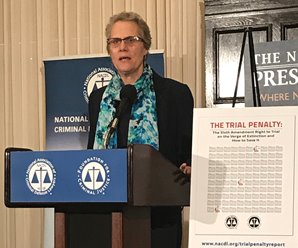 Photo by Cathy Zlomek
Photo by Cathy Zlomek
“The Innocence Project and the other 68 projects in the Innocence Network have long been concerned about the pervasive and relatively unchecked use of guilty pleas in the American criminal justice system — in which innocent people routinely plead guilty . . . The National Registration of Exonerations, which tracks exonerations postconviction, count 409 innocent people, later exonerated, who pled guilty. Included in these are more than 10 percent of the 358 people who were proven innocent by DNA . . . While we know what the deals were for the hundreds of innocent who pled guilty, many of the other 1,800 exonerees who went to trial and lost were first offered plea deals, which they rejected . . . Dwayne Dale was charged with rape and child sex abuse. He was offered three years of probation for lewd and lascivious conduct. He was innocent, went to trial, lost, and was sentenced to two life sentences plus 13 years. He served 18 years before he was exonerated. Chris Miller was offered seven years if he would plead guilty to a lesser charge and name his accomplice. He went to trial, was found guilty, sentenced to 40 years, and served 17 before he was exonerated . . . Any system that is built on a foundation that makes it rational for an innocent person to take a plea is in need of reform. A criminal justice system that routinely forces innocent people to plead guilty is unfair and unjust.”
Jordan Richardson, Senior Policy Analyst, Charles Koch Institute
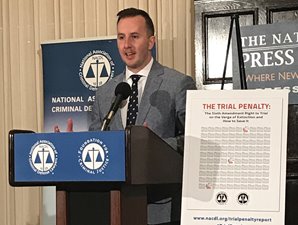 Photo by Cathy Zlomek
Photo by Cathy Zlomek
“What brings the right and the left together? It’s not much. But in criminal justice reform, this is one of the issues that we’ve discovered we all actually agree that something needs to happen, something needs to change . . . The diminished power of the jury and the rise of plea bargaining is a danger to liberty . . . John Adams said that representative government and trial by jury are the heart and lungs of liberty. Well, it’s facing cardiac arrest right now. The sobering reality of our criminal justice system is that threatening to tear someone away from their family, freeze their assets, and lock them behind bars for years, and sometimes for life, is one of the most destructive penalties allowable beside death itself . . . As conservatives, as libertarians, as people from the left and right, if we care about protecting liberty and if we care about guarding against the power of government and having citizens be the true check, ‘we the people’ as a check upon government, then we had better be sure that we are strengthening the jury. I am so pleased that NACDL is highlighting this important issue.”
Rebecca Shaeffer, Senior Legal and Policy Officer, Fair Trials International
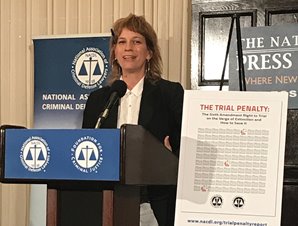 Photo by Cathy Zlomek
Photo by Cathy Zlomek
“Without simplifying the picture too much, the astonishing [international] growth in the incidence of plea bargaining very much has a U.S. nexus — the adoption of plea bargaining tracks where the U.S. has been active in providing technical support for criminal procedure reform . . . Plea bargaining is a kind of poison pill in the adversary system. It contains the ability to undermine itself. So as other countries adopt the adversarial system they are learning the ability to not have a trial at all . . . What we are asking for jurisdictions to do when they are looking at the adoption of plea bargaining is to view the U.S. model not really as an inspiration for their own reforms but as a cautionary tale as to what can happen if plea bargaining is allowed to overtake open and fair trials . . . The order of magnitude of the trial penalty in this country is something that you do not see anywhere else . . . I can’t tell you how many conversations I have had with U.S. reformers. Try to talk to them about plea bargaining and they say, ‘Yes, it is a problem, but there is no solution.’ This report shows that this is not true. There are solutions. They are just multifaceted.”
The leaders of two noteworthy groups were unable to attend due to conflicting events, but they sent written remarks:
Kevin Ring, President, Families Against Mandatory Minimums
“The slow disappearance of our constitutional right to trial gets far too little attention. This report should serve as a wake-up call for lawmakers and lay people alike . . . My personal experience with the trial penalty, which NACDL highlights in its report, demonstrates why this issue is of more than academic interest to me. This report explains why it should matter to everyone.”
Jeffery Robinson, Deputy Legal Director and Director of the Trone Center for Justice and Equality, American Civil Liberties Union
“The NACDL report tells a not-so-hidden secret about the criminal legal system. Specifically, that innocent people plead guilty because they are faced with a ‘trial penalty’ — if you plead guilty, your behavior deserves penalty A, but if you go to trial, you get penalty B, which is so many times more severe . . . The fact that it has always been this way does not make it right. The NACDL report sets out what we have lost and risk losing as the right to a trial disappears.”
About the Author
Norman L. Reimer is NACDL’s Executive Director and Publisher of The Champion.
Norman L. Reimer
NACDL
Washington, DC
202-465-7623
www.nacdl.org
@NACDL
nreimer@nacdl.org













